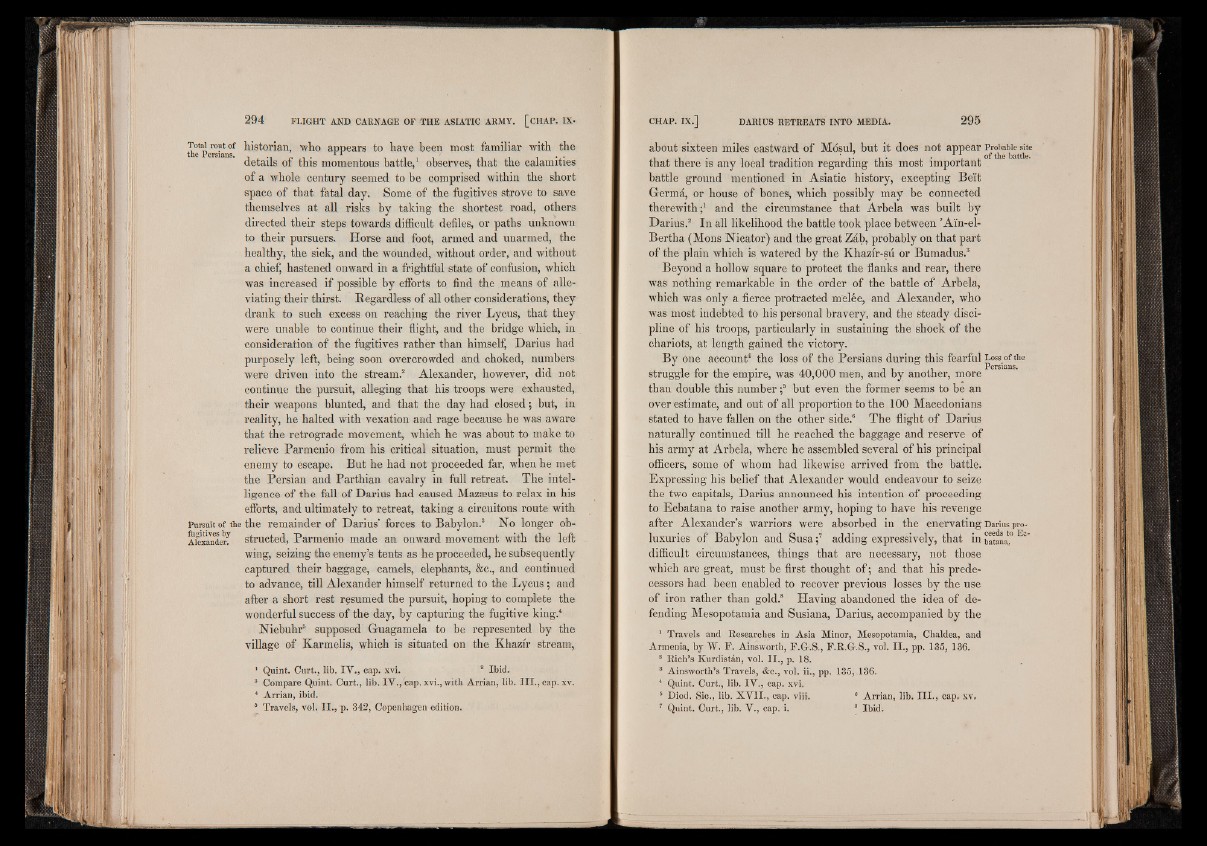
Total root of historian, who appears to have been most familiar with the
the Persians. , .. i i ' i • • details oi this momentous battle, observes, that the calamities
of a whole century seemed to be comprised within the short
space of that fatal day. Some of the fugitives strove to save
themselves at all risks by taking the shortest road, others
directed their steps towards difficult defiles, or paths unknown
to their pursuers. Horse and foot, armed and unarmed, the
healthy, the sick, and the wounded, without order, and without
a chief, hastened onward in a frightful state of confusion, which
was increased if possible by efforts to find the means of alleviating
their thirst. Regardless of all other considerations, they
drank to such excess on reaching the river Lycus, that they
were unable to continue their flight, and the bridge which, in
consideration of the fugitives rather than himself, Darius had
purposely left, being soon overcrowded and choked, numbers
were driven into the stream.2 Alexander, however, did not
continue the pursuit, alleging that his troops were exhausted,
their weapons blunted, and that the day had closed; but, in
reality, he halted with vexation and rage because he was aware
that the retrograde movement, whieh he was about to make to
relieve Parmenio from his critical situation, must permit the
enemy to escape. But he had not proceeded far, when he met
the Persian and Parthian cavalry in full retreat. The intelligence
of the fall of Darius had caused Mazseus to relax in his
efforts, and ultimately to retreat, taking a circuitous route with
Pursait of the the remainder of Darius’ forces to Babylon.3 No longer ob-
Aieximdei\ structed, Parmenio made an onward movement with the left
wing, seizing the enemy’s tents as he proceeded, he subsequently
captured their baggage, camels, elephants, &c., and continued
to advance, till Alexander himself returned to the Lycus ; and
after a short rest resumed the pursuit, hoping to complete the
wonderful success of the day, by capturing the fugitive king.4
Niebuhr6 supposed Guagamela to be represented by the
village of Karmelis, which is situated on the Khazir stream,
1 Quint. Curt., lib. IV ., cap. xvi. " Ibid.
3 Compare Quint. Curt., lib. IV ., cap. xvi., with Arrian, lib. I I I ., cap. xv.
4 Arrian, ibid.
6 Travels, vol. I I ., p. 342, Copenhagen edition.
about sixteen miles eastward of Mosul, but it does not appear Probable site
i , . . . * . . . . of the battle. that there is any local tradition regarding this most important
battle ground mentioned in Asiatic history, excepting Belt
Germa, or house of bones, which possibly may be connected
therewith;1 and the circumstance that Arbela was built by
Darius.2 In all likelihood the battle took place between ’Ai'n-el-
Bertha (Mons Nicator) and the great Zab, probably on that part
of the plain which is watered by the Khazir-su or Bumadus.3
Beyond a hollow square to protect the flanks and rear, there
was nothing remarkable in the order of the battle of Arbela,
which was only a fierce protracted mel6e, and Alexander, who
was most indebted to his personal bravery, and the steady discipline
of his troops, particularly in sustaining the shock of the
chariots, at length gained the victory.
By one account4 the loss of the Persians during this fearful Loss of the
" ? Persians. struggle for the empire, was 40,000 men, and by another, more
than double this number ;5 but even the former seems to be an
over estimate, and out of all proportion to the 100 Macedonians
stated to have fallen on the other side.6 The flight of Darius
naturally continued till he reached the baggage and reserve of
his army at Arbela, where he assembled several of his principal
officers, some of whom had likewise arrived from the battle.
Expressing his belief that Alexander would endeavour to seize
the two capitals, Darius announced his intention of proceeding
to Ecbatana to raise another army, hoping to have his revenge
after Alexander’s warriors were absorbed in the enervating Darius proluxuries
of Babylon and Susa ;7 adding expressively, that in ^»¡¡¡¡k E°
difficult circumstances, things that are necessary, not those
which are great, must be first thought of; and that his predecessors
had been enabled to recover previous losses by the use
of iron rather than gold.8 Having abandoned the idea of defending
Mesopotamia and Susiana, Darius, accompanied by the
1 Travels and Researches in Asia Minor, Mesopotamia, Chaldea, and
Armenia, by W. F . Ainsworth, F.G.S., F.R.G.S., vol. I I ., pp. 135, 136,
2 Rich’s Kurdistan, vol. I I ., p. 18.
8 Ainsworth’s Travels, &c., vol. ii., pp. 135, 136.
4 Quint. Curt., lib. IV., cap. xvi.
5 Diod. Sic., lib. X V II., cap. viii. 6 Arrian, lib. I I I . , cap, xv.
7 Quint. Curt., lib. V., cap. i. 3 Ibid,